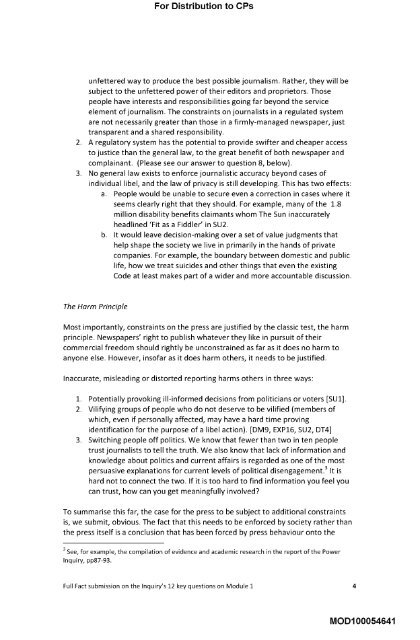Third Submission by Full Fact - The Leveson Inquiry
Third Submission by Full Fact - The Leveson Inquiry
Third Submission by Full Fact - The Leveson Inquiry
Create successful ePaper yourself
Turn your PDF publications into a flip-book with our unique Google optimized e-Paper software.
.<br />
.<br />
For Distribution to CPs<br />
unfettered way to produce the best possible journalism. Rather, they will be<br />
subject to the unfettered power of their editors and proprietors. Those<br />
people have interests and responsibilities going far beyond the service<br />
element of journalism. <strong>The</strong> constraints on journalists in a regulated system<br />
are not necessarily greater than those in a firmly-managed newspaper, just<br />
transparent and a shared responsibility.<br />
A regulatory system has the potential to provide swifter and cheaper access<br />
to justice than the general law, to the great benefit of both newspaper and<br />
complainant. (Please see our answer to question 8, below).<br />
No general law exists to enforce journalistic accuracy beyond cases of<br />
individual libel, and the law of privacy is still developing. This has two effects:<br />
a. People would be unable to secure even a correction in cases where it<br />
seems clearly right that they should. For example, many of the 1.8<br />
million disability benefits claimants whom <strong>The</strong> Sun inaccurately<br />
headlined ’Fit as a Fiddler’ in SU2.<br />
b. It would leave decision-making over a set of value judgments that<br />
help shape the society we live in primarily in the hands of private<br />
companies. For example, the boundary between domestic and public<br />
life, how we treat suicides and other things that even the existing<br />
Code at least makes part of a wider and more accountable discussion.<br />
<strong>The</strong> Harm Principle<br />
Most importantly, constraints on the press are justified <strong>by</strong> the classic test, the harm<br />
principle. Newspapers’ right to publish whatever they like in pursuit of their<br />
commercial freedom should rightly be unconstrained as far as it does no harm to<br />
anyone else. However, insofar as it does harm others, it needs to be justified.<br />
Inaccurate, misleading or distorted reporting harms others in three ways:<br />
.<br />
2.<br />
.<br />
Potentially provoking ill-informed decisions from politicians or voters [SU1].<br />
Vilifying groups of people who do not deserve to be vilified (members of<br />
which, even if personally affected, may have a hard time proving<br />
identification for the purpose of a libel action). [DM9, EXP16, SU2, DT4]<br />
Switching people off politics. We know that fewer than two in ten people<br />
trust journalists to tell the truth. We also know that lack of information and<br />
knowledge about politics and current affairs is regarded as one of the most<br />
persuasive explanations for current levels of political disengagement. 3 It is<br />
hard not to connect the two. If it is too hard to find information you feel you<br />
can trust, how can you get meaningfully involved?<br />
To summarise this far, the case for the press to be subject to additional constraints<br />
is, we submit, obvious. <strong>The</strong> fact that this needs to be enforced <strong>by</strong> society rather than<br />
the press itself is a conclusion that has been forced <strong>by</strong> press behaviour onto the<br />
3 See, for example, the compilation of evidence and academic research in the report of the Power<br />
<strong>Inquiry</strong>, pp87-93.<br />
<strong>Full</strong> <strong>Fact</strong> submission on the <strong>Inquiry</strong>’s 12 key questions on Module 1<br />
MOD100054641
















